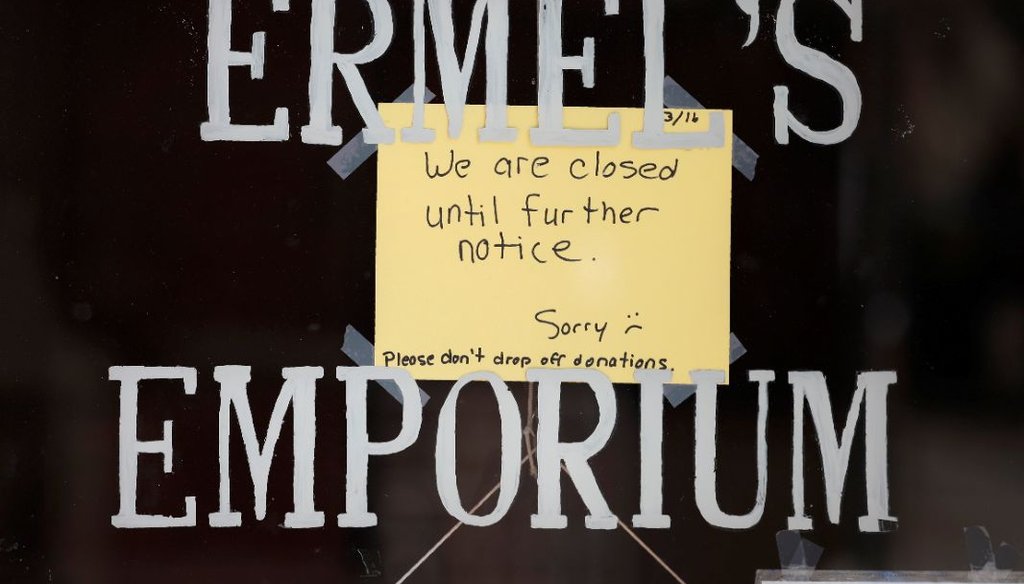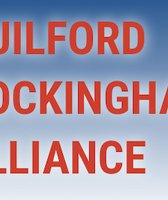Get PolitiFact in your inbox.

A sign hangs on the front door of a store shuttered store due to efforts to fend off coronavirus, in Central City, Colo., on March 17, 2020. (AP)
If Your Time is short
• Trouble in the housing and finance sectors caused the 2008 recession. By contrast, the current downturn has a far more unusual source: a pandemic.
• The current downturn is hitting much faster, and social distancing has the potential to impact broader swaths of the economy. But there’s hope that once the pandemic ends, pent-up demand could push a quicker recovery.
• Because of this, some of the tools used to fight off the Great Recession may not work this time. Other approaches may show more promise.
With the rising likelihood of a recession caused by the coronavirus outbreak, lawmakers have begun talking about remedies that will sound familiar to anyone who lived through the Great Recession of 2008: stimulus checks, assistance to hard-hit businesses, and moves by the Federal Reserve.
But economists say the upcoming recession is actually quite different from the Great Recession — and that will have consequences for the policy response.
Some of the old remedies are already in the works. But other approaches may be necessary due to the unusual nature of the coronavirus outbreak.
Here, we’ll examine the differences between 2008 and 2020 and consider what those differences mean about how best to ease the nation’s economic pain.
What are the differences between the 2008 and 2020 recessions?
There are more differences between the two recessions than similarities. "The current situation is radically different," said Daniel Mitchell, a libertarian economist.
The 2008 recession "was caused by a lack of demand, pure and simple," said Dean Baker, co-founder of the liberal Center for Economic and Policy Research. "The crash of the housing bubble sent construction plummeting."
By contrast, the current crisis was not caused by pre-existing economic weakness.
"There was little evidence of an approaching downturn as recently as a month or two ago," said Gary Burtless, an economist at the Brookings Institution. "Unemployment remained low, job growth was reasonably steady, inflation was moderate, the Federal Reserve had taken no recent steps to curb U.S. economic growth to avert wage or price inflation. Consumer confidence was reasonably high, and there was little sign of financial distress either among U.S. businesses or households."
Instead, the impending recession stems from a health problem and the fear of contagion.
This is an important distinction for several reasons:
• It’s a rare cause for a recession, so there’s no ready game plan. The last time this happened may have been the recession that followed the Spanish flu of 1918. But the times then were very different, both in terms of the economy and in terms of medical knowledge and technology. So there is no ready model for policymakers to follow.
• The contraction is poised to happen with unusual speed. A slowdown in residential investment began in late 2005, even though the economy would not enter recession until late 2007, said Steve Fazzari, an economist at Washington University in St. Louis. "In the current crisis, the shutdown of big parts of the economy looks like it will happen over just a few weeks."
The sudden shift from ordinary economic activity to measures to preserve public safety "sounds more like a war than a conventional recession," said Tara Sinclair, a George Washington University economist.
• Social distancing is having a unique effect on the economy. The response to the coronavirus has been to keep people physically apart, which makes it difficult if not impossible to spend money as before, at everything from shops to restaurants to theaters to travel-related industries.
This reality will leave long-lasting effects on the economy. Collectively, "the consumer behavior and policy decisions are likely to produce a decline in GDP that may very well last 2 calendar quarters or longer," Burtless said.
• The current downturn has the potential to be temporary. There’s still deep uncertainty about how quickly the pandemic will pass, especially if second and third waves of infections emerge, requiring future rounds of social distancing. But once the epidemic passes, there will be pent-up demand..
"If we can borrow from the future and put off production from today while keeping income flowing, then we could be in a position to see quite a quick return to our old economic lives," Sinclair said.
This offers hope for a better scenario than what played out after the Great Recession.
"The lost borrowing and spending after 2009 did not come back at anything like the same rate as in the years before 2007, especially in residential construction," Fazzari said. "In the current crisis, once the virus infections hopefully relent, people will want to travel and go to restaurants and bars. If the virus infections subside in a couple of months, most households will likely be able to afford to resume more or less normal life, and the economy can bounce back."
• More businesses in more economic sectors may fail than they did during the 2008 recession. While the Great Recession had broad economic impact, "no sector of the economy had to completely shut down," Fazzari said. "Fewer people went to restaurants in the Great Recession, but much of the restaurant business remained."
The current crisis, however, has left these types of businesses with no customers.
• We could see supply-side interruptions. During the Great Recession, goods moved freely. If someone was ready to buy a product or service, companies were able to meet that demand.
In the coronavirus crisis, however, some production may be shut down because employees are not able to come to work.
"This kind of thing is largely unprecedented," Fazzari said. "It is a downside risk factor that could magnify both the severity and the persistence of the current crisis."
This is especially problematic for international supply chains, which may be affected by curbs in transportation and entry.
• This could be a more transformative recession for the economy than 2008. Expect change. Some might be positive, such as people being exposed to working at home finding that they like it, which could support advances in telework that could mean new revenue for technological suppliers.
The need to impose social distancing could also enforce far-reaching changes on the way goods and services are distributed, such as the flow of groceries.
"Right now, grocery stores are missing many crucial items, such as milk, bread, potatoes, and basic medical supplies that consumers are now forced to find by visiting two or more retail outlets, sometimes without success," Burtless said. "My understanding is that there is no genuine shortage of most of these items, either nationally or regionally. But a more orderly way of distributing and rationing access to groceries and medical items would ensure that more consumers would end up with some amount of most of the needed items, with fewer face-to-face interactions with retail clerks and fellow consumers."
How do these differences affect the economic solutions?
The economists we interviewed offered these ideas for responding to the coronavirus crisis.
• Short-term payments. We found widespread support among economists for cash payments to people and businesses, though also a clear-eyed understanding of the limits of that approach.
"I don’t think universal payments and/or business loans will prevent short-term economic harm, but if the federal government is going to do something, then payments and loans at least address a real problem — the temporary loss of income — with a plausible action, the temporary provision of cash," said Mitchell, the libertarian economist.
At the same time, payments of this sort won’t be an economic cure-all. In a conventional recession, handing out stimulus money helps people spend quickly. But there are limits to how effective giving out cash can be at a time when people are required to stay in their houses most of the time. Unlike in a conventional recession, stimulus checks probably won’t help restaurants, bars, theaters, and vacation destinations stay afloat.
"If travel, entertainment, restaurants, and discretionary shopping are off the table for higher-income families, any extra cash they receive is likely to be saved, not spent," Fazzari said. "The need to focus stimulus on the lower part of the income distribution is especially important in this crisis."
• Loans or other assistance to businesses. These payments could be aimed broadly, or at certain sectors that are particularly hard hit. "There are powerful reasons to keep many of these otherwise-profitable businesses afloat during the emergency, through extensions of government credit or, as a last resort, government grants, possibly calculated as a percentage of targeted companies’ past payrolls," Burtless said.
If businesses get aid, experts said, it needs to be targeted for the benefit of workers, rather than executives. "We want to make sure the jobs are there when workers are ready to go back," Sinclair said.
• Federal Reserve moves. The Federal Reserve can use several levers in a crisis. (We go into greater detail on those levers here; they include signaling about future interest rates, asset purchases, and helping financial institutions with loans or guarantees.) "I think it is important that the Fed has taken action early," Sinclair said. "They were making sure banks remained solvent, that they had liquidity."
• Forward-looking policy proposals. Some government efforts may be designed to be implemented over the longer term. Congress approved a modified version of paid family leave, for instance, in its first response to the coronavirus crisis. A more complete version could be implemented later, as could infrastructure spending.
• Pausing all payments for mortgages, rents, and utilities. This is now being tried in hard-hit European countries and is under consideration in the United States. This puts the economy into a temporary deep freeze, with American families hunkering down with reduced income but also reduced obligations.
For most people, the cost of housing and utilities makes up a significant share of their disposable income. If what they owe drops significantly, then the financial pressure from getting laid off declines, particularly if the unusual nature of this recession means that the economy is able to return to something approaching normal fairly quickly.
Our Sources
The Independent, "Coronavirus: Italy suspends mortgage payments amid lockdown," March 10, 2020
New York Times, "Mortgage Lenders Consider Plan to Suspend Payments Amid Crisis," March 17, 2020
PolitiFact, "Despite rates at 0%, Fed still has tools available to stabilize the economy," March 18, 2020
Email interview with Daniel Mitchell, libertarian economist, March 17, 2020
Email interview with Dean Baker, co-founder of the liberal Center for Economic and Policy Research, March 17, 2020
Email interview with Gary Burtless, economist at the Brookings Institution, March 17, 2020
Email interview with Steve Fazzari, economist at Washington University in St. Louis, March 19, 2020
Interview with Tara Sinclair, George Washington University economist, March 17, 2020
Interview with Gary Richardson, University of California-Irvine economist, March 17, 2020
































